
E-Water
Scope & Guideline
Transforming Knowledge into Action for Water Sustainability
Introduction
Aims and Scopes
- Water Consumption and Behavioral Studies:
Research that investigates public attitudes and behaviors towards water consumption, including the influence of social media and communication strategies. - Entrepreneurship and Market Development in Water Solutions:
Exploration of entrepreneurial initiatives that address water-related challenges, particularly in developing regions, highlighting innovative market solutions for sanitation and water access. - Technological Innovations in Water Treatment:
Focus on advancements in water treatment technologies, including systems for recovering nutrients like phosphorus from wastewater, emphasizing sustainable practices.
Trending and Emerging
- Social Media Influence on Water Conservation:
The rise of studies analyzing the role of social media, particularly platforms like Instagram, in shaping public attitudes and behaviors towards water consumption indicates a growing recognition of digital communication's impact on environmental issues. - Entrepreneurial Innovations for Sanitation Solutions:
The exploration of entrepreneurial solutions for sanitation, especially in developing countries, underscores an increasing focus on market-driven approaches to address water and sanitation challenges, reflecting the need for sustainable development. - Sustainable Wastewater Management Practices:
Research into advanced treatment systems for recovering resources from wastewater, such as phosphorus, showcases a trend towards sustainable practices that not only address waste management but also resource recovery.
Declining or Waning
- Traditional Water Resource Management:
There has been a noticeable reduction in studies centered around conventional water management practices, as the focus shifts towards more innovative and sustainable approaches. - General Water Quality Studies:
Research that broadly addresses water quality without specific technological or entrepreneurial focus appears to be less prevalent, indicating a move towards targeted solutions and applications.
Similar Journals

Hydrology Research
Connecting researchers for impactful hydrology discoveries.Hydrology Research, a leading academic journal published by IWA Publishing, is dedicated to advancing the field of water science and technology. With an impressive impact factor and a Q2 ranking in its category, the journal plays a pivotal role in disseminating innovative research and practices in hydrology. Established in 1973 and transitioning to an Open Access model in 2020, it provides unrestricted access to high-quality articles that cover a broad spectrum of topics, including hydrological processes, water management, and environmental impact assessments. Situated in Denmark, Hydrology Research continues to thrive as an essential platform for researchers, professionals, and students alike, encouraging the exchange of ideas that contribute to sustainable water solutions worldwide. With a comprehensive coverage of research converging from 1973 to 2024, it stands as a testament to ongoing progress in the water science community.
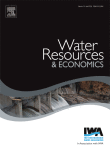
Water Resources and Economics
Advancing Knowledge at the Intersection of Water and Economics.Water Resources and Economics, published by Elsevier, is a prestigious journal that bridges the gap between water resource management and economic theory. With an ISSN of 2212-4284, this journal has been an essential resource in the fields of Economics, Geography, and Water Science since its inception in 2013. Holding a notable Q2 ranking in the 2023 Category Quartiles for Economics and Econometrics, Geography, Planning and Development, and Water Science and Technology, it showcases cutting-edge research that addresses the increasing importance of sustainable water management in a rapidly changing climate. The journal's rigorous peer-review process ensures the dissemination of high-quality studies that influence policy and practice. As it continues to grow within the academic landscape, Water Resources and Economics strives to provide actionable insights and innovative approaches for professionals, researchers, and students invested in the sustainability and economics of water resources. For additional information, please refer to the journal’s website for access and submission guidelines.
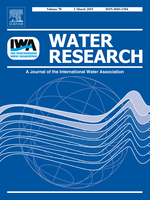
WATER RESEARCH
Transforming water research into actionable insights.WATER RESEARCH, published by Pergamon-Elsevier Science Ltd, is a premier international journal dedicated to the advancement of knowledge in the interdisciplinary field of water science and technology. With a significant impact factor, WATER RESEARCH holds a distinguished position, consistently ranking in the top quartile (Q1) across multiple categories including Civil and Structural Engineering, Environmental Engineering, and Pollution. Established in 1967 and set to continue its legacy until at least 2024, this journal provides a vital platform for researchers and professionals to disseminate cutting-edge findings related to water sustainability, quality, and management. Although the journal follows a traditional access model, its commitment to disseminating impactful research ensures that it remains an essential resource for academia and industry alike. With a rigorous selection process, the journal includes articles that significantly contribute to the understanding and resolution of global water-related challenges, making it an invaluable asset for researchers, students, and practitioners engaged in this critical area of study.

Water Resources and Industry
Navigating the Intersection of Water Science and IndustryWater Resources and Industry, published by Elsevier, stands at the forefront of research in the critical fields of water science and technology, as well as geography, planning, and development. With an impressive 2023 impact factor that places it in the Q1 category for both Geography and Water Science on a global scale, this journal is a vital resource for academics, professionals, and students seeking to advance their understanding of water-related issues impacting industries worldwide. Since its inception in 2013 as an Open Access journal, it has fostered innovative research and practical solutions to challenges in water resource management. Located in the vibrant academic hub of Amsterdam, the journal encourages submissions that cover a broad spectrum of topics, from sustainable practices and policy development to technological advancements in water treatment and distribution. By making its research publicly accessible, Water Resources and Industry not only contributes to scholarly discourse but also empowers stakeholders to implement evidence-based strategies for water sustainability, thereby enhancing its relevance and impact in today's world.
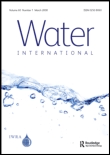
WATER INTERNATIONAL
Catalyzing Change for a Sustainable Water FutureWATER INTERNATIONAL is a leading journal in the realms of water science and policy, published by Routledge Journals, Taylor & Francis Ltd. With its ISSN 0250-8060 and E-ISSN 1941-1707, the journal has maintained a robust scholarly presence since its inception in 1975, with contributions focused on management, monitoring, and policy pertaining to water resources. Currently convening from 1975 to 2024, WATER INTERNATIONAL is recognized for its significant impact, reflected in its Q2 category rankings within Environmental Science sectors—ranked #157/399 in Management, Monitoring, Policy and Law, and #103/261 in Water Science and Technology. The absence of an open access option does not diminish its importance, as it continues to serve as a crucial platform for interdisciplinary researchers, professionals, and students aiming to address the challenges surrounding water governance and sustainability. With its focus on innovative methodologies and policy-oriented research, the journal stands at the forefront of advancing knowledge in water resource management.
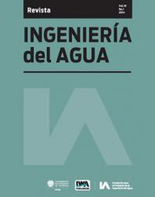
Ingenieria del Agua
Advancing Sustainable Solutions in Water EngineeringIngenieria del Agua, published by Universitat Politècnica de València, Editorial UPV, is a prominent open-access journal dedicated to the field of water engineering and management. With its ISSN 1134-2196 and E-ISSN 1886-4996, this journal has been facilitating the dissemination of critical research and innovative practices in water resources since 1994. With a commitment to providing unrestricted access to high-quality research, Ingenieria del Agua aims to serve as a pivotal platform for researchers, professionals, and students alike. Focused on the intersection of hydrology, environmental engineering, and sustainability, the journal encourages submissions that address contemporary challenges in water resource management, promoting advancements that are vital for both ecological conservation and societal needs. By fostering a collaborative academic environment, it plays an essential role in shaping the future of water engineering.
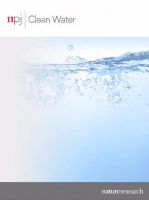
npj Clean Water
Driving policy advancements for safe water access.npj Clean Water, published by NATURE PORTFOLIO, is a premier open-access journal dedicated to advancing the field of water science and technology. Since its launch in 2018, this innovative publication has quickly established itself as a leading platform for original research and policy discussions concerning clean water access and quality. With an impressive impact factor and categorized in the Q1 Quartile across multiple environmental science disciplines—including management, monitoring, pollution, and waste management—npj Clean Water stands out for its rigorous peer-review process and commitment to disseminating high-quality research. Researchers, professionals, and students involved in water-related challenges will find invaluable insights that address critical environmental issues and promote sustainable practices. Access to articles is freely available, encouraging global collaboration and knowledge sharing within the water sector. This journal embodies a significant step towards achieving innovation and policy advancements in the pursuit of a cleaner, safer water future.
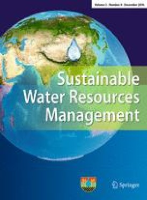
Sustainable Water Resources Management
Driving impactful practices for sustainable water resources.Sustainable Water Resources Management is an esteemed journal focusing on the critical field of water resource management in the context of sustainability. Published by Springer International Publishing AG, this journal serves as a vital platform for researchers, policymakers, and practitioners to disseminate cutting-edge research and innovative practices aimed at addressing global water challenges. With an impressive impact factor aligned with its Q2 ranking in Water Science and Technology and Q3 in Renewable Energy, Sustainability, and the Environment, it maintains a robust reputation in its field, evidenced by its Scopus rankings. Covering a diverse range of topics from integrated water resource management to the nexus between water and energy, Sustainable Water Resources Management is committed to fostering knowledge exchange and encouraging interdisciplinary dialogue among its audience. This journal, operating under strict academic rigor, plays an essential role in advancing sustainable practices and is open from 2015 to 2024, making it a relevant resource in today’s rapidly evolving environmental context.
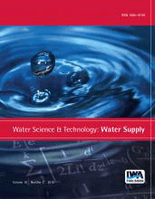
Water Supply
Exploring innovations in water science.Water Supply is an esteemed journal published by IWA PUBLISHING that plays a pivotal role in the field of water science and technology. With an ISSN of 1606-9749 and an E-ISSN of 1607-0798, this journal has been a key resource for researchers and professionals since its inception in 2001. Now covering a wide range of topics until 2024, it is recognized for its impactful contributions, holding a Q2 ranking in the Environmental Science: Water Science and Technology category, and currently stands at rank #125 out of 261 in Scopus, reflecting its relevance and influence in the academic community. The journal aims to disseminate significant research findings and innovations in water supply management, ensuring that professionals and students are equipped with the latest knowledge and practices in the sector. Despite not being an open-access journal, Water Supply continues to attract high-quality submissions that enhance our understanding and preservation of vital water resources. For those invested in sustainable water practices, this journal is an invaluable tool for continued learning and advancement.

Water Resources
Innovating for a sustainable future in water management.Water Resources, a prominent journal published by MAIK NAUKA/INTERPERIODICA/SPRINGER, focuses on the critical and evolving field of water science and technology. Established in 1976 and with a long-standing commitment to advancing knowledge, this journal explores interdisciplinary research that addresses the challenges surrounding water resource management, quality, and sustainability. With an impact factor positioned within the Q3 category of its field, it holds a notable Scopus rank (#181/261) in Environmental Science, emphasizing its role in driving scholarly discourse. While currently not open access, Water Resources provides vital insights for researchers, professionals, and students, making it an essential resource for those seeking to innovate and implement effective water management solutions. To stay ahead in a domain that is increasingly paramount to global sustainability efforts, consider engaging with the latest research published in this vital journal.